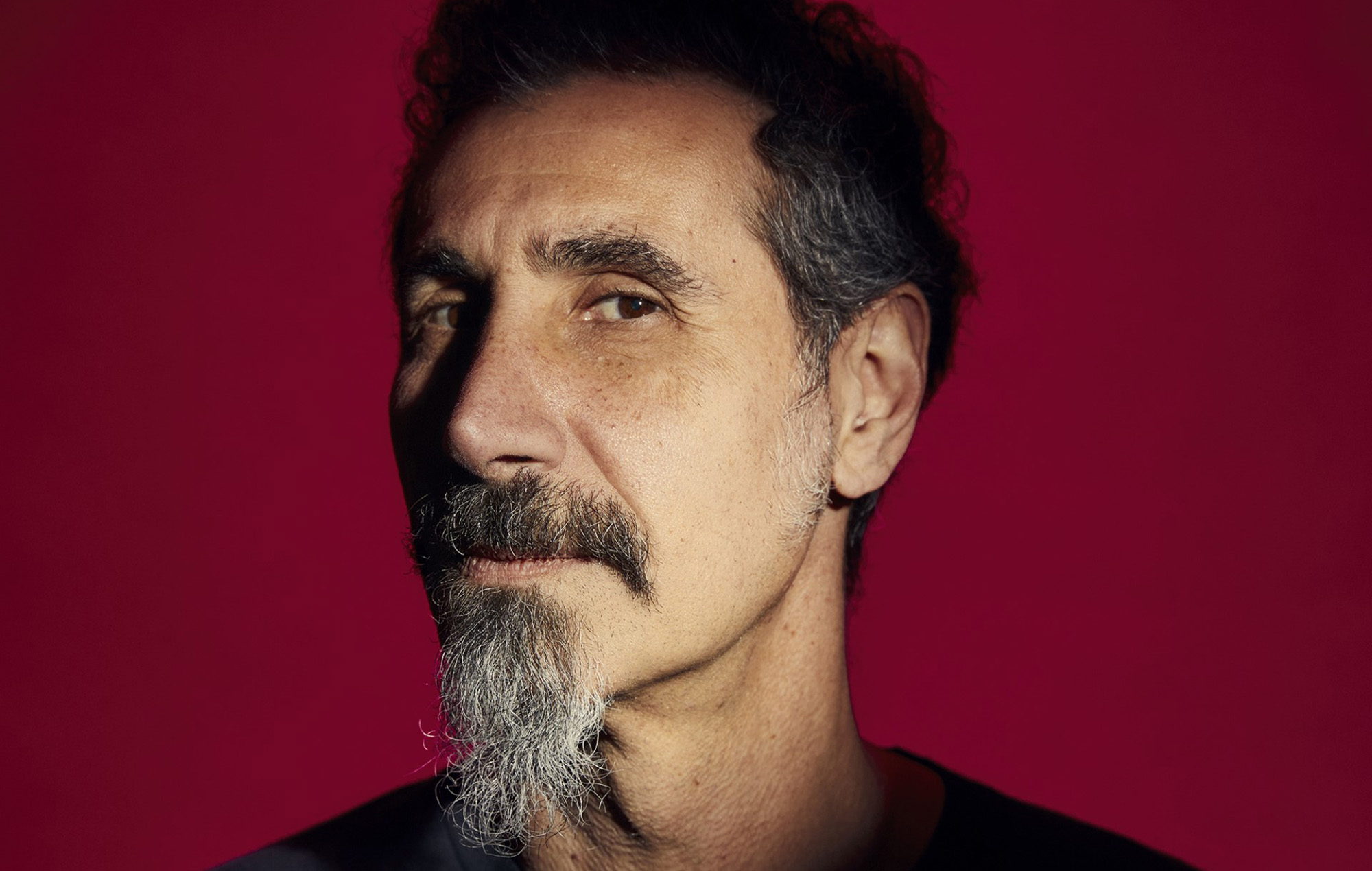“If you’re chased out of your homeland,” writes Serj Tankian in his new autobiography Down With The System, “a part of you is always trying to get back there, even generations later.” This idea sits at the heart of the System Of A Down vocalist’s powerful memoir, reaching far back in time – beyond his own dramatic life in music and activism – to tell his ancestors’ stories.
All four of Tankian’s grandparents survived the Armenian genocide, perpetrated in 1915 under the Ottoman Empire but still unrecognised by many governments today, including the UK’s. Tankian has long used his platform to fight for this story’s recognition – “a whole race, genocide,” he sings on System Of A Down’s 1998 track ‘P.L.U.C.K.’ – and details it here in harrowing prose: “It’s important to know who you are,” he says, “from those who brought you to this place.”
An especially vivid portrait is devoted to his grandfather Stepan. “He was the fighter in the family,” Tankian tells NME. “I’ve inherited his legacy in a way.” A child during the genocide, Stepan was forced from his home on a death-march to the Syrian desert – beset by disease, torture and starvation. Against all odds, Stepan lived to old age – long enough to hear about the success of his grandson’s band. “He was so proud of me,” Tankian beams. “I said, ‘we’re spreading awareness about your story, and the genocide, and the importance for proper recognition of history.’ It was not in his last days, but pretty close.”
The memoir also details another, less-discussed influence on Tankian’s views about justice. After moving to California from Tankian’s native Beirut, his father found success designing women’s shoes, but was financially ruined by a lawsuit from a disgruntled ex-business partner. “That really degenerated my parents’ belief in the justice system,” Tankian explains. “They lost everything.” Possessing better English than his parents, the 16-year-old Tankian had to help deal with the lawyers to protect his family. “Seeing my parents unravel emotionally, and physically – it was really difficult to experience.”
This led Tankian to consider a career in law, until a fateful late-night drive through Laurel Canyon: slamming on his brakes, he vowed aloud to pursue his passion for music. What advice would he give to others at a similar juncture? “As far as we know, there’s one life you’re living.” While everyone needs to make a living, “you have to have some room for your passion. There are so many doors you cannot see, and they can all open if you find out what it is you’re here to do,” he says. “It requires waking up in the morning and going ‘what am I excited about?’”
Down With The System details Tankian’s early musical efforts, including his first turn as a singer in the band Soil. Singing did not come naturally, and at one point they secretly tried to replace him. “I was trying to find my voice, because normally people sing with other people’s voices – whoever they’re influenced by,” Tankian says. After just one show, and a lineup change, Soil morphed into System Of A Down.
Of all the memoir’s stories illustrating System Of A Down’s explosive rise, the most striking is of a free concert in a Hollywood carpark on the eve of ‘Toxicity’’s release in September 2001. “We were expecting three or four-thousand people,” Tankian says, “then I think 10,000 people showed up.” After the fire marshal advised the concert was unsafe, the LAPD threatened to arrest the band if they went onstage – even just to explain the situation. “They just pulled our banner down, and everything went wild,” he says. “An actual LAPD riot occurred – we all felt horrible.”
‘Toxicity’ topped the US charts a week later, the same day as the 9/11 attacks. Down With The System illustrates here what it meant to be a politicised band in the media landscape of the time: major radio group Clear Channel banned their single ‘Chop Suey!’ from its stations, along with 164 other songs deemed ‘lyrically questionable’ under the circumstances, including John Lennon’s ‘Imagine’. “Social media and the devolution of the radio world has changed the game,” Tankian suggests. “Politicised bands have so much more access to people.”
Recent months have seen a new wave of music activism amid the Israel-Gaza conflict: from gigs raising money for humanitarian aid, to boycotts of SXSW over its sponsorship by the US army. “It’s important for the youth to raise their voice, because we are not living in a just world,” Tankian says. “I think in some cases, pure activism is taken hostage by certain fringe elements of society, including in the US – certain anti-Semites who have gotten into that world. However, I think the majority of the activists and their intentions are pure, and I think what they’re doing is important,” he says.
“In terms of the Hamas invasion of Israel, I want to say that was obviously a terrorist act and they are war criminals and deserve to be punished,” he says. “But, the Netanyahu government’s response is also – as we can see with the number of civilians that have died – a war crime.” Tankian also highlights the less-discussed story of Azerbaijan’s invasion of Nagorno Karabakh last September. “Azerbaijan attacked the 120,000 residents of this area who have been living there for time immemorial,” he says. “Incredible injustice, humanitarian catastrophe, genocide, war crimes, is happening today – so yes, there is going to be pushback.”
Tankian’s own decades-long activism was rewarded with a milestone in 2021. “Congress passed a resolution formally recognising the Armenian genocide committed by the Ottoman Turks in 1915,” he explains. However, he caveats this victory. “Right after, Joe Biden basically wrote a cheque to Azerbaijan for military purposes,” who had “invaded parts of Armenia proper,” he says. “Even the intention of Congress to pass the genocide resolution was a way of punishing Turkey for buying the S-400 missiles from Russia,” he suggests. “It’s all politics.”
His feelings on System Of A Down are less reserved. “I’m extremely proud of my band for, along with non-profits and Armenian communities worldwide, lobbying for recognition of the Armenian genocide,” he says. “For us, it was a personal quest – all our grandparents are survivors.” In 2015, they marked the genocide’s centenary with an enormous show in Armenia’s capital, Yerevan. “I always describe that as the top of the mountain for System Of A Down,” he smiles. “It was beautiful.”
Their last album was 2005’s ‘Hypnotise’, and the memoir details their latest, unsuccessful attempts at a new one in 2018. In those sessions, Tankian proposed a new set of working principles: “egalitarian ideas of sharing publishing, not controlling the writing process, everyone having a veto on every song,” he lists. “There was some openness to it at first, but then it got shut down, and I backed off.” Their differences, he stresses, are not personal. “We love each other, we respect each other, but we have creative differences and that’s stopped us going forwards,” he says. “Maybe one day it won’t.”
Today, his focus is on this memoir – shocked by its rapturous reception. “There’s a lot of interesting lessons in my own life, and I hope it sparks something in young creators or would-be creators,” he smiles. “That would be awesome.”
Serj Tankian’s memoir ‘Down With The System’ is out now
The post System Of A Down’s Serj Tankian: “We are not living in a just world” appeared first on NME.



